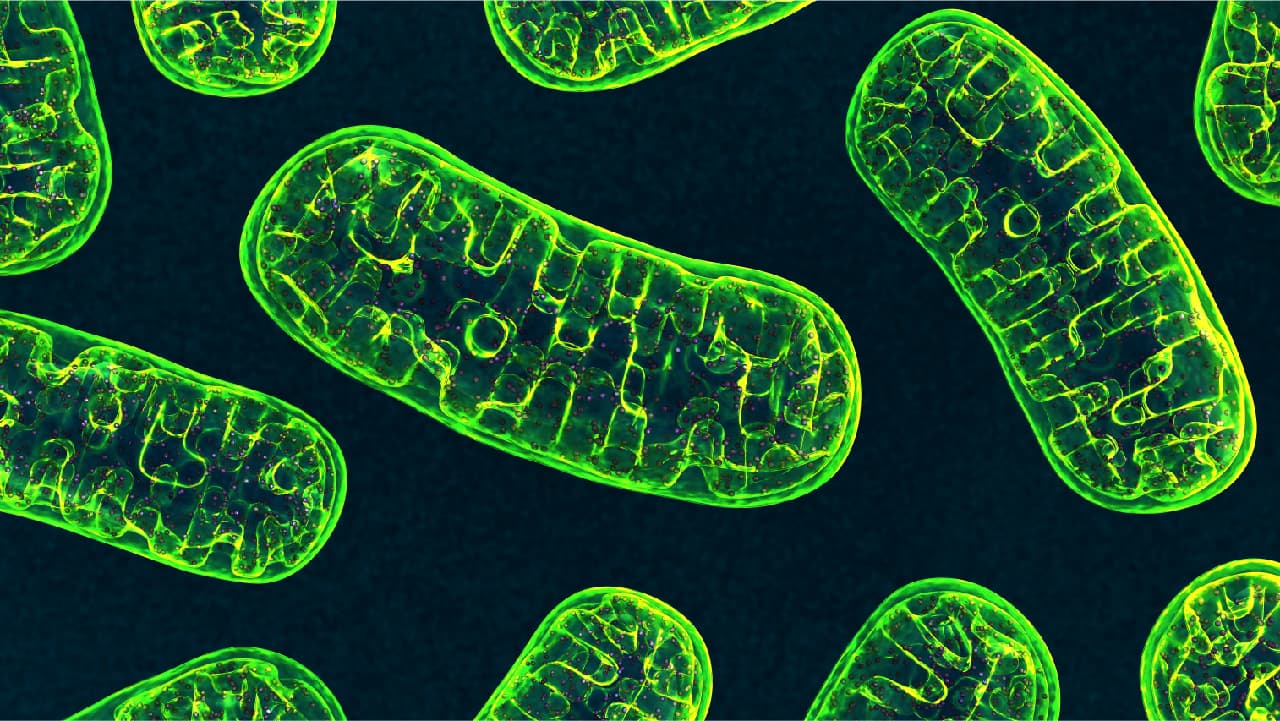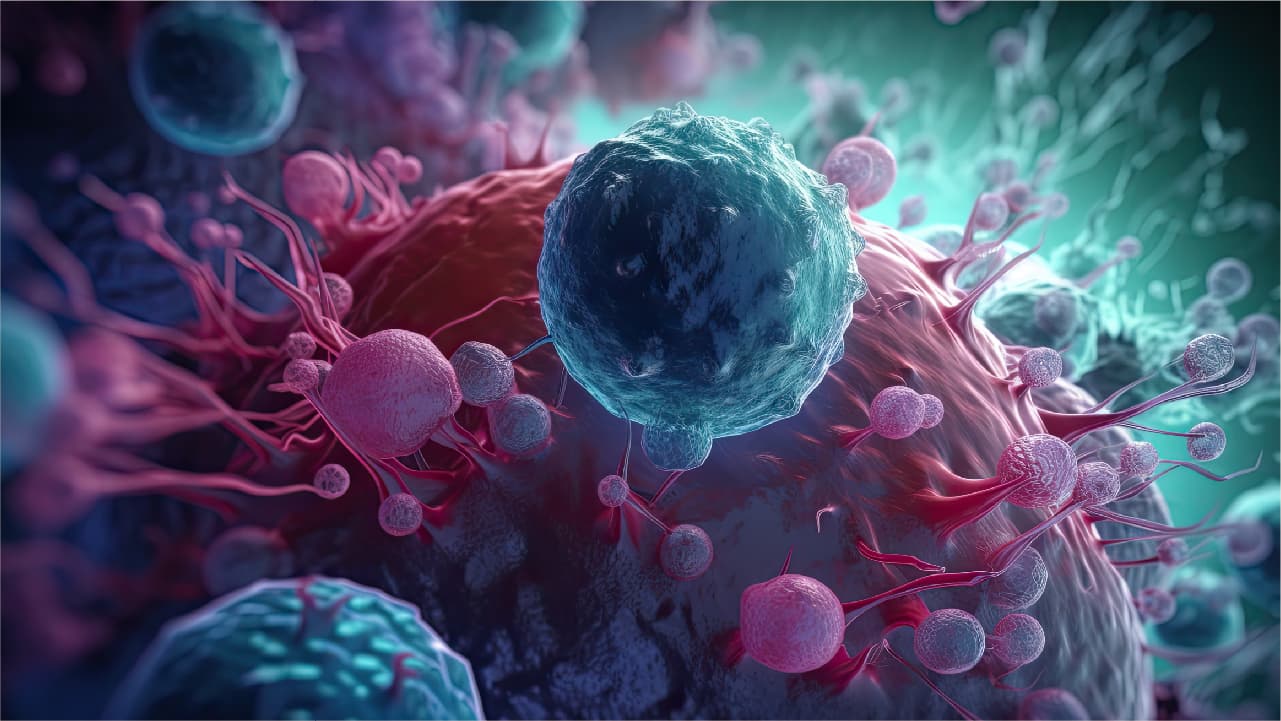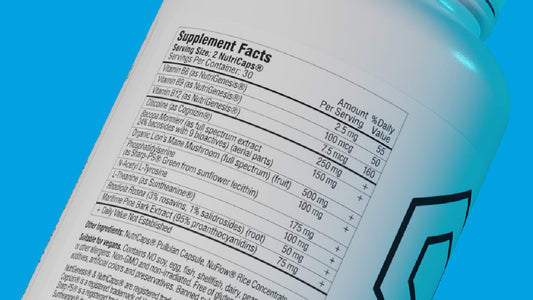Everyone needs good neighbors, right?
The ones who take your parcels in, re-capture your runaway bin, weed your side of the driveway. And do it for no other reason than it's simply better for everyone that way...
They're just looking out for you.
And sometimes they can really save the day. Checking on your home whilst you're away, or raising the alarm when they see something suspicious. The ones who have your best interests at heart and aren't afraid to pick up the phone, send a text or say, "something's not right - do you want me to do something about it?"
Your mitochondria do a similar job when something's not right in your cells.
Not only do they take in nutrients from foods and break them down to produce energy, but they also send SOS signals when they're under stress. Not only that, they also formulate a plan, and set about repairing and restoring damaged mitochondria.
We have a lot to thank these guys for.

During cellular stress, mitochondria may collect misfolded or damaged proteins. If these proteins are left to accumulate, they can be harmful, and have been associated with neurodegenerative disorders like Alzheimer's, Parkinson's, and Huntington's disease.
When mitochondria experience stress, two signals are released in the cell's cytosol (the fluid inside the cell). Both signals work together to activate a stress response called the mitochondrial unfolded protein response (UPRmt).
UPRmt: An elite task force that restores homeostasis.
The UPRmt plays a role in ensuring the proteins within mitochondria are correctly folded and functioning. Housekeeping/homeostasis. Here's a basic overview of how UPRmt works:
Stress Recognition: When there's a build-up of misfolded or unfolded proteins in the mitochondria, this triggers the UPRmt.
Signaling: The stress in the mitochondria is communicated to the cell's nucleus.
Transcriptional Changes: In response to the signal, the cell's nucleus activates or upregulates the expression of specific genes. These genes typically code for mitochondrial chaperone proteins (which help in protein folding) and proteases (which degrade misfolded proteins).
Restoration of Homeostasis: The increased production of chaperones and proteases aims to restore normal protein folding in the mitochondria, thereby ensuring the organelle's proper function.
Cell Fate Decision: If the stress is too severe and the UPRmt cannot restore normalcy, the cell may undergo apoptosis (programmed cell death) to prevent potential harm that could arise from dysfunctional mitochondria.
Mitochondria, they're kind of a big deal.
What are mitochondria?

Mitochondria are the little powerhouses in our cells that take the food we eat and the oxygen we breathe and convert them into energy. That energy is called adenosine triphosphate or ATP, and it's used to support every function of the body.
Each of our cells holds hundreds or even thousands of mitochondria. They're found in greater amounts in really active organs and tissues like the muscles, the heart, and the brain. And each one contains assembly lines for making ATP.
Mitochondria are the place where our metabolism happens. When your mitochondria aren't working effectively, your metabolism runs less efficiently. The twist is that our mitochondria are very sensitive, which means they're easily damaged. And when they're damaged, we feel that in the form of low energy, fatigue, brain fog and even rapid aging.
What impacts mitochondria?

Our mitochondria are sensitive souls, and are easily damaged by things we do in our day to day lives. Oxidative stress can be caused by consuming too many calories, chemicals in our foods, sugar in our diet, and environmental toxins. All these factors can start this chain reaction of cellular and tissue damage.
It's crucial to care for our mitochondria.
How to support your mitochondria?
The good news is, if you want happy, thriving, replicating mitochondria, there's a lot you can do on a daily basis. Diet and nutrition, sleep, exercise, and detoxification are all key steps to taking care of your mitochondria.
Diet

Mitochondria require a diet rich in antioxidants. Eating a wide variety of colorful fruit and vegetables (organic if possible). We're all familiar with the 5 a day rule, but realistically, we should be aiming for eight to twelve servings of fresh vegetables, fruits, nuts, and seeds every day. These types of foods are full of antioxidants and phytonutrients that protect your mitochondria.
Magnesium is an essential nutrient for energy production in mitochondria. Rich magnesium sources include dark leafy vegetables, seeds, legumes, nuts, seafood, and organic chocolate.
Omega-3 polyunsaturated fatty acids improve mitochondrial function. Along with B vitamins, carnitine, vitamin C, and selenium, found in foods like citrus fruits, seeds, fish, and meat.
Sleeping Habits

Studies show that mitochondrial remodeling is maximized during sleep. Aiming for seven to nine hours a night is essential for brain detoxification and metabolic waste removal. Inadequate sleep can lead to the accumulation of beta-amyloid, which is associated with Alzheimer's and is potentially damaging for brain mitochondria.
Physical Activity
 Studies indicate that regular endurance exercise can boost mitochondrial numbers in skeletal muscles by up to 40%. It's essential to find a balance; over-exercising without adequate rest can be detrimental. Incorporating weight training, with ample recovery, can be beneficial. Studies have also shown that HIIT is effective for inducing mitochondrial biogenesis.
Studies indicate that regular endurance exercise can boost mitochondrial numbers in skeletal muscles by up to 40%. It's essential to find a balance; over-exercising without adequate rest can be detrimental. Incorporating weight training, with ample recovery, can be beneficial. Studies have also shown that HIIT is effective for inducing mitochondrial biogenesis.
Detoxification

Minimizing exposure to toxins is crucial. Transition to non-toxic cleaning agents, look into your cosmetic choices, and seek out natural skin care brands who prioritize organic, non-toxic GMO-free ingredients.
Mitochondria do more than just producing energy.
They also create essential building blocks for other molecules and provide substances that support chemical reactions. Additionally, they produce cofactors, which help with various cellular processes.
Catering to the needs of mitochondria is as crucial as eliminating the actions and elements that harm them.
How to keep our mitochondria happy
These powerhouses have multiple responsibilities. So supporting your mitochondria will have multiple benefits. Performance Lab® Energy contains meticulously studied ingredients to enhance mitochondrial function in multi-faceted ways.

CoQ10
- Found in every cell's mitochondrion, CoQ10 facilitates production of adenosine triphosphate (ATP), the primary energy currency of cells.
- CoQ10 converts into ubiquinol: An antioxidant that protects mitochondria from free radicals' cell-damaging, age-accelerating effects.
- Shown to stimulate formation of fresh new mitochondria in response to oxidative stress.
- Plain CoQ10 is difficult to absorb. That's why Performance Lab® Energy uses bioavailability-enhanced MicroActive® Q10.
BioPQQ®
- Works together with CoQ10 to boost, multiply, and protect mitochondria powerhouses in nearly every cell in the body.
- PQQ is suggested to possess 5,000 x the antioxidant power of vitamin C, providing strong mitochondrial protection.
Acetyl-L-Carnitine (ALCAR)
- Transports waste materials and toxins out of the mitochondria.
- Helps to strengthen and protect mitochondrial membranes.
R-Lipoic Acid (Bio-Enhanced)
- A universal antioxidant that helps counter oxidative stress in all areas and is suggested to reverse age related mitochondrial enzyme decline.
- Directly recycling and extending activity of mitochondria-protective antioxidants including CoQ10 and vitamin C.
NutriGenesis® Magnesium Malate
- Optimizes the function and structure of mitochondria.
Mitochondria are at the very core of our well-being. Responsible for the energy we feel, to defending against the debilitating effects of aging. It's crucial to recognize that the care and respect we give these cellular powerhouses today, directly influences how we feel tomorrow.
So, the next time you take a moment for self-care, remember it's not just for you, but for the billions of mitochondria working tirelessly to keep you at your best. Their health is your health.














